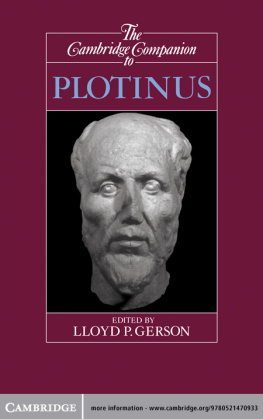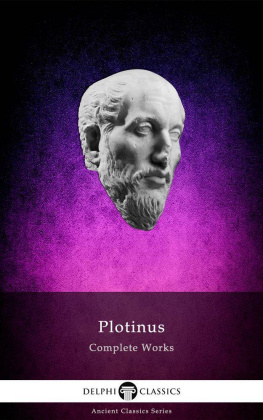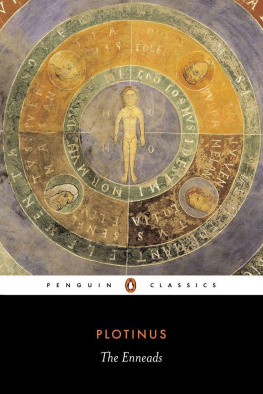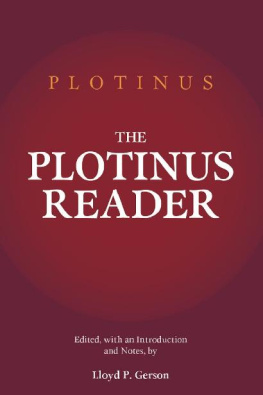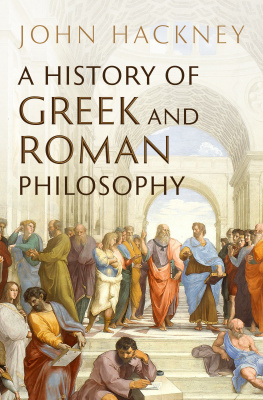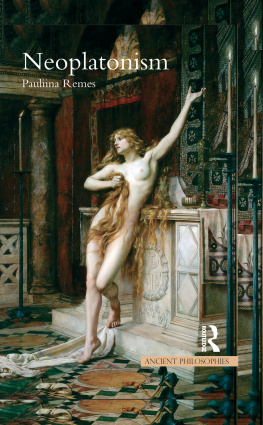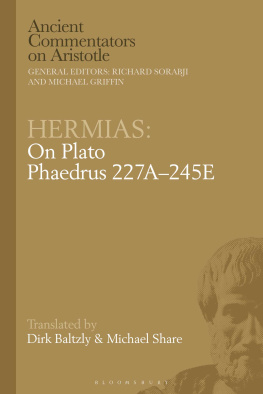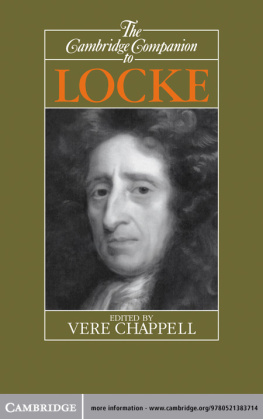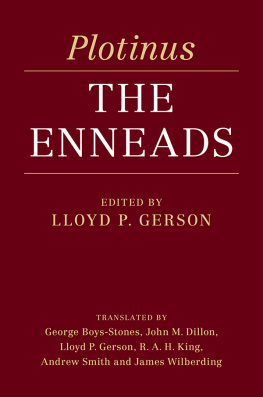Each volume of this series of companions to major philosophers contains specially commissioned essays by an international team of scholars, together with a substantial bibliography, and will serve as a reference work for students and nonspecialists. One aim of the series is to dispel the intimidation such readers often feel when faced with the work of a difficult and challenging thinker.
Plotinus is the greatest philosopher in the 700-year period between Aristotle and Augustine. He thought of himself as a disciple of Plato, but in his efforts to defend Platonism against Aristotelians, Stoics, and others, he actually produced a reinvigorated version of Platonism that later came to be known as Neoplatonism. In this volume, sixteen leading scholars introduce and explain the many facets of Plotinuss complex system. They place Plotinus in the history of ancient philosophy while showing how he was a founder of medieval philosophy.
New readers and nonspecialists will find this the most convenient and accessible guide to Plotinus currently available. Advanced students and specialists will find a conspectus of recent developments in the interpretation of Plotinus.
THE CAMBRIDGE COMPANION TO
PLOTINUS
The Cambridge Companion to
PLOTINUS
Edited by Lloyd P. Gerson

CAMBRIDGE UNIVERSITY PRESS
Cambridge, New York, Melbourne, Madrid, Cape Town, Singapore, So Paulo
Cambridge University Press
The Edinburgh Building, Cambridge CB2 2RU, UK
Published in the United States of America by Cambridge University Press, New York
www.cambridge.org
Information on this title: www.cambridge.org/9780521470933
Cambridge University Press 1996
This publication is in copy. Subject to statutory exception
and to the provisions of relevant collective licensing agreements,
no reproduction of any part may take place without
the written permission of Cambridge University Press.
First published 1996
Reprinted with corrections 1999
A catalogue record for this publication is available from the British Library
ISBN-13 978-0-521-47093-3 hardback
ISBN-10 0-521-47093-5 hardback
ISBN-13 978-0-521-47676-8 paperback
ISBN-10 0-521-47676-3 paperback
Transferred to digital printing 2005
CONTENTS
LLOYD P. GERSON
MARIA LUISA GATTI
JOHN BUSSANICH
DOMINIC J. OMEARA
HENRY J. BLUMENTHAL
KEVIN CORRIGAN
MICHAEL F. WAGNER
DENIS OBRIEN
ANDREW SMITH
EYJLFUR KJALAR EMILSSON
SARA RAPPE
STEPHEN R. L. CLARK
GEORGES LEROUX
JOHN M. DILLON
FREDERIC M. SCHROEDER
CRISTINA DANCONA COSTA
JOHN RIST
CONTRIBUTORS
HENRY J. BLUMENTHAL is Reader in Greek at Liverpool University. He is the author of Plotinus Psychology and has edited several books on Neoplatonism, including Neoplatonism and Early Christian Thought. Some of his articles are collected in Soul and Intellect: Studies in Plotinus and Later Neoplatonism.
JOHN BUSSANICH is Associate Professor of Philosophy at the University of New Mexico. He is the author of The One and its Relation to Intellect in Plotinus and Ancient Philosophy After Aristotle (forthcoming).
STEPHEN R. L. CLARK is Professor of Philosophy at Liverpool University. His most recent books include Gods World and the Great Awakening, How to Think About the Earth, and How to Live Forever. He is the editor of the Journal of Applied Philosophy.
KEVIN CORRIGAN is Professor of Philosophy and Classics at St. Thomas More College, University of Saskatchewan. He is the author of Plotinus Theory of Matter-Evil and The Question of Substance: Plato, Aristotle, and Alexander of Aphrodisias (forthcoming), and many articles on ancient and medieval philosophy.
CRISTINA DANCONA COSTA is Research Assistant at the Universit di Padova, Instituto di Storia della Filosofia. She is the author of Recherches sur le Liber de Causis, a translation of Thomas Aquinass commentary on the Liber de Causis, and articles on Plotinus and Proclus.
JOHN M. DILLON is Regius Professor of Greek, Trinity College, Dublin. He is the author of The Middle Platonists; The Golden
Chain: Studies in the Development of Platonism and Christianity; Alcinous. The Handbook of Platonism; and scholarly editions of works of Iamblichus, Philo of Alexandria, Proclus, and Dexippus.
EYJLFUR KJALAR EMILSSON is Professor of Philosophy at the University of Oslo, Norway. He is the author of Plotinus on Sense Perception and many articles on Plotinus.
MARIA LUISA GATTI is Professor of Philosophy at the Universit Cattolica del Sacro Cuore, Milan. She is the author of Plotino e le metafisica della contemplazione and many articles on the Platonic tradition.
LLOYD p. GERSON is Professor of Philosophy at the University of Toronto. He is the author of Plotinus in the Arguments of the Philosophers series; God and Greek Philosophy: Studies in the Early History of Natural Theology; translations of Aristotle and Hellenistic philosophy, and many articles in ancient philosophy.
GEORGES LEROUX is Professor of Ancient Philosophy at the Universit du Qubec, Montreal. He is the author of Plotin. La libert et la volont de lUn (Ennead VI. 8) and many articles on Plato and Neoplatonism.
DENIS OBRIEN formerly Fellow of Gonville and Caius College, Cambridge, has since 1971 been Directer de Recherche at the Centre National de la Recherche Scientifique, Paris. His books include Empedocless Cosmic Cycle. A Reconstruction from the Fragments and Secondary Sources; tudes sur Parmenides; Theories of Weight in the Ancient World in four volumes, two of which are forthcoming; Plotinus on the Origin of Matter, and many articles on ancient philosophy.
DOMINIC J. OMEARA is Professor at the University of Fribourg, Switzerland. He is the author of Plotinus. An Introduction to the Enneads; Pythagoras Revisited. Mathematics and Philosophy in Late Antiquity; and many works on various aspects of ancient and medieval Platonism.
SARA RAPPE is Assistant Professor of Classical Studies at the University of Michigan. She is the author of articles on Plato, Plotinus, and the Platonic tradition.
JOHN RIST is Professor of Classics and Philosophy at the University of Toronto. His many books include Plotinus. The Road to Reality; The Mind of Aristotle; Stoic Philosophy; Epicurus. An Introduction; Augustine. Ancient Thought Baptized; and many articles on ancient philosophy.
FREDERIC M. SCHROEDER is Professor of Classics at Queens University, Kingston, Ontario. He is the author of Form and Transformation. A Study in the Philosophy of Plotinus and many other works on Plotinus and late Aristotelianism.
ANDREW SMITH is Professor of Classics at University College, Dublin. He is the author of Porphyrys Place in the Neoplatonic Tradition and the Teubner edition of Porphyrys Fragments.
MICHAEL F. WAGNER is Professor of Philosophy at the University of San Diego and the author of articles on Plotinus and early medieval philosophy.
THE ENNEADS
The following is a list of the treatises comprising the Enneads with :he titles that appear in Porphyrys edition. The chronological ordering is indicated in brackets.
| I.1 [53] | What is the Living Being and What is Man? |

